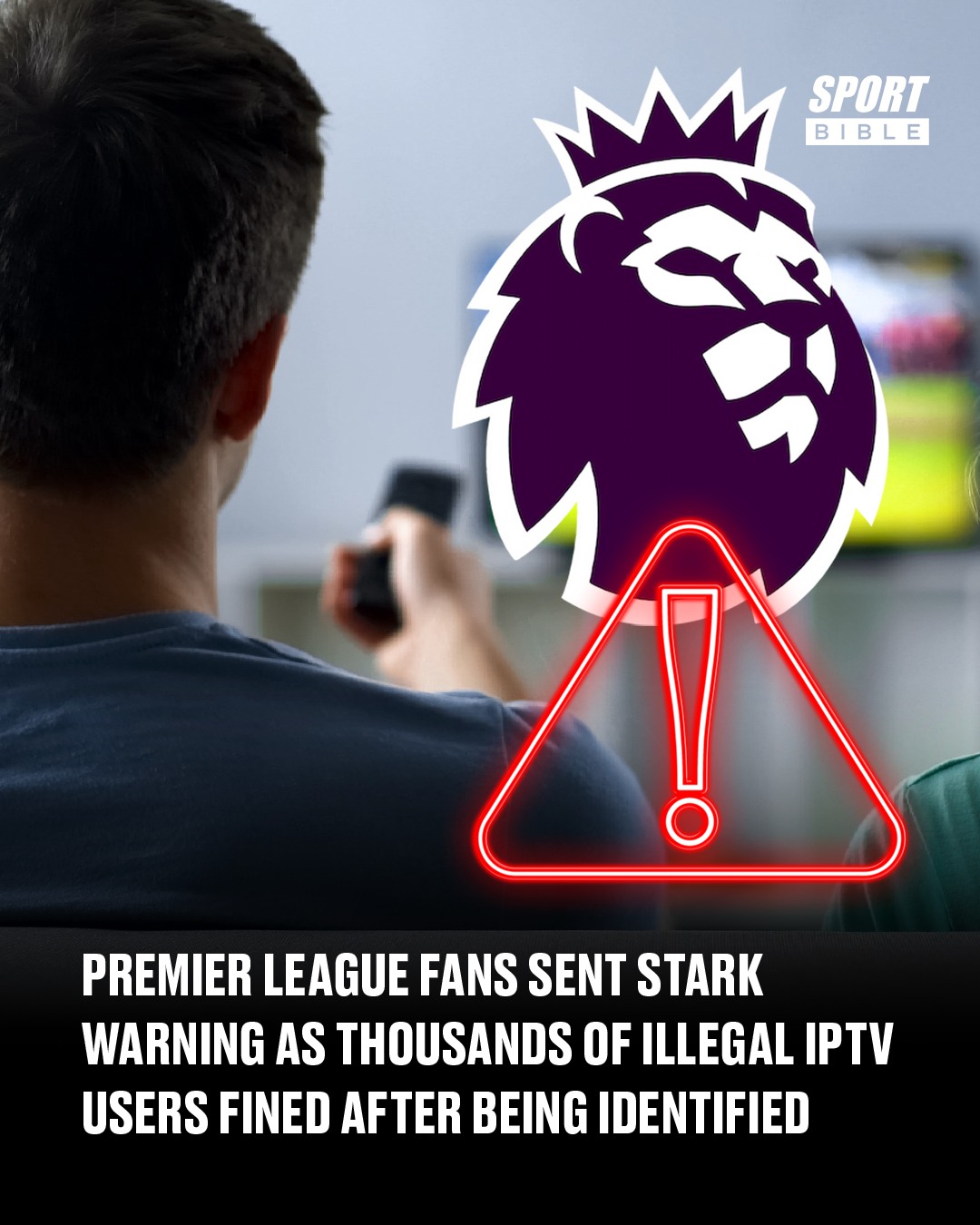Premier League Fans Face Unprecedented Crackdown on Illegal IPTV Services: A Comprehensive Analysis of the Growing Battle Against Digital Piracy

The world of sports broadcasting has entered a new era of enforcement, with authorities across Europe launching an unprecedented crackdown on illegal Internet Protocol Television (IPTV) services. This comprehensive campaign has resulted in thousands of fines, prison sentences, and a stark warning to Premier League fans who have turned to these unauthorized streaming platforms as an alternative to increasingly expensive legitimate subscription services.
The Rising Tide of IPTV Usage
The proliferation of IPTV services represents a significant shift in how sports content is consumed globally. As traditional broadcasting costs continue to escalate, with premium services like Sky Sports and TNT Sports commanding substantial monthly fees, millions of viewers have sought alternative means to access their favorite sporting events. This economic pressure has created a perfect storm for the growth of illegal streaming platforms, which offer comprehensive sports packages at a fraction of the cost of legitimate services.
Internet Protocol Television, commonly known as IPTV, fundamentally differs from traditional broadcasting methods by delivering television content through internet connections rather than conventional terrestrial, satellite, or cable formats. While legitimate IPTV services exist and operate within legal frameworks, the technology has been extensively exploited by criminal organizations to distribute copyrighted content without authorization from rights holders.
The appeal of these illegal services extends beyond mere cost savings. Many unauthorized IPTV platforms offer extensive channel lineups, including international sports coverage, premium movie channels, and specialized content that might otherwise be unavailable or prohibitively expensive through official channels. This comprehensive offering, combined with increasingly sophisticated user interfaces and reliable streaming quality, has made illegal IPTV services an attractive proposition for consumers facing subscription fatigue.
European Enforcement Initiatives
The response from European authorities has been swift and decisive, with multiple countries implementing coordinated strategies to combat the growing threat of digital piracy. The scale and sophistication of these enforcement efforts represent a significant escalation in the ongoing battle between rights holders and those who distribute copyrighted content without authorization.
Italy’s Comprehensive Approach
Italy has emerged as a leader in the fight against illegal IPTV services, implementing one of the most comprehensive enforcement frameworks in Europe. The Italian approach demonstrates how collaboration between multiple agencies can create an effective deterrent against digital piracy. The establishment of a collaboration protocol between the Italian Prosecutor’s Office, Guardia di Finanza, and the country’s telecommunications regulator and competition authority, Agcom, has created a streamlined process for identifying and prosecuting offenders.
This multi-agency approach has proven remarkably effective, with recent operations resulting in fines for 2,282 users of illegal IPTV devices across Italy. The success of this initiative stems from the strategic sharing of information between different government agencies, allowing for more efficient identification of suspects and streamlined prosecution processes. The memorandum of understanding between these parties has enabled authorities to approach suspected offenders with fines of up to £5,000, creating a significant financial deterrent for potential users.
The Italian model has gained particular attention following a major crackdown in Lecce during December, which contributed significantly to the high number of users being fined. This operation demonstrated the effectiveness of coordinated enforcement efforts and has since been studied by other European nations as a potential template for their own anti-piracy initiatives.
Belgium’s Targeted Interventions
Belgium has taken a different but equally effective approach to combating illegal streaming services. In April, the sports streaming service DAZN partnered with Belgian authorities to implement targeted blocking measures against infringing platforms. This collaboration resulted in the blocking of 100 streaming websites and five IPTV platforms specifically identified as engaging in copyright infringement.
The Belgian approach emphasizes the importance of partnership between private rights holders and government agencies. By working directly with content providers like DAZN, authorities can more effectively identify and target the most problematic platforms while ensuring that enforcement efforts align with the specific needs and concerns of the sports broadcasting industry.
This collaborative model has proven particularly effective in addressing the rapid evolution of illegal streaming services. As criminal organizations quickly adapt their methods to avoid detection, the close partnership between private sector experts and government enforcement agencies allows for more agile and responsive countermeasures.
United Kingdom’s Escalating Penalties
The United Kingdom has adopted a particularly aggressive stance toward IPTV-related offenses, with courts imposing increasingly severe penalties for those involved in distributing illegal services. The case of a Liverpool man who received a custodial sentence of three years and four months represents a significant escalation in the severity of punishments for IPTV-related crimes.
This particular case involved an individual who uploaded illegal services onto Firestick devices in return for cash-in-hand payments, demonstrating the commercial nature of many IPTV operations. The Premier League’s official statement regarding this case emphasized that the individual had ignored multiple warnings to cease his activities, highlighting the deliberate and persistent nature of his offenses.
The severity of this sentence sends a clear message to others involved in similar activities and represents a significant departure from earlier, more lenient approaches to digital piracy. The three-year and four-month sentence demonstrates that courts are increasingly treating IPTV-related offenses as serious crimes with substantial consequences for those involved.
The Economic Impact on Sports Broadcasting
The rise of illegal IPTV services has created significant economic challenges for the sports broadcasting industry, with rights holders facing substantial revenue losses due to unauthorized distribution of their content. The Premier League, as one of the world’s most valuable sports properties, has been particularly affected by this trend, with estimates suggesting that piracy costs the league hundreds of millions of pounds annually.
The economic impact extends beyond direct revenue losses to rights holders. Legitimate broadcasters who have invested heavily in acquiring sports rights find themselves competing against free illegal alternatives, undermining their ability to recoup these investments through subscription revenue. This dynamic creates a vicious cycle where legitimate providers may be forced to increase prices to maintain profitability, potentially driving more consumers toward illegal alternatives.
The advertising revenue model that supports many sports broadcasts has also been significantly affected by piracy. When viewers watch content through illegal streams, advertisers lose the ability to reach their target audiences through official channels, reducing the overall value of sports advertising opportunities and further undermining the economic foundation of legitimate sports broadcasting.
Technological Sophistication and Criminal Networks
Modern illegal IPTV operations have evolved far beyond simple streaming websites to become sophisticated criminal enterprises with complex technological infrastructure and international networks. These organizations employ advanced techniques to evade detection, including the use of multiple server locations, encrypted communications, and constantly changing domain names.
The technological sophistication of these operations has made enforcement efforts increasingly challenging. Criminal organizations often operate across multiple jurisdictions, making it difficult for any single country’s authorities to effectively shut down their operations. This international dimension has necessitated increased cooperation between law enforcement agencies across different countries, as demonstrated by the European initiatives described above.
The use of devices like modified Firesticks and dedicated IPTV boxes has further complicated enforcement efforts by making illegal streaming services appear more legitimate to end users. These devices often come pre-configured with access to illegal content, allowing users to access unauthorized streams without requiring technical expertise or knowledge of the underlying criminal networks.
Legal Frameworks and Enforcement Challenges
The legal landscape surrounding IPTV piracy continues to evolve as authorities adapt to new technologies and criminal methods. Traditional copyright law, while providing a foundation for prosecution, often struggles to address the unique challenges posed by digital piracy, including issues of jurisdiction, identification of offenders, and the rapid evolution of distribution methods.
The establishment of specialized units within law enforcement agencies has become increasingly important for effective enforcement. These units combine technical expertise with legal knowledge to investigate and prosecute complex digital crimes. The Italian model, with its formal collaboration protocol between multiple agencies, represents one approach to addressing these challenges through improved coordination and resource sharing.
The role of Internet Service Providers (ISPs) in enforcement efforts has also become increasingly important. Many countries have implemented or are considering legislation that would require ISPs to block access to known illegal streaming services, though the effectiveness of such measures remains debated due to the ease with which criminal organizations can change their technical infrastructure.
The Premier League’s Response Strategy
The Premier League has adopted a multi-faceted approach to combating illegal IPTV services, combining legal enforcement with public education and technological countermeasures. The league’s partnership with FACT (Federation Against Copyright Theft) represents a significant investment in enforcement capabilities, with the organization helping to pursue both civil and criminal remedies against those involved in piracy.
This partnership has already produced tangible results, with numerous fines and prison sentences imposed on individuals involved in illegal streaming operations. The Premier League’s approach emphasizes both deterrence through visible enforcement actions and disruption of criminal networks through coordinated law enforcement efforts.
The league has also invested heavily in technological countermeasures designed to make illegal streaming more difficult and less reliable. These measures include watermarking technologies that help identify the source of pirated content, automated systems for detecting and shutting down illegal streams, and improved security measures for legitimate broadcasting infrastructure.
Consumer Behavior and Market Dynamics
The growth of illegal IPTV services reflects broader changes in consumer behavior and expectations regarding access to sports content. Modern consumers increasingly expect on-demand access to content across multiple devices and platforms, creating challenges for traditional broadcasting models that were designed around scheduled programming and specific viewing locations.
The fragmentation of sports rights across multiple platforms has also contributed to the appeal of illegal IPTV services. When consumers must subscribe to multiple services to access their preferred sporting events, the cost can quickly become prohibitive, making illegal alternatives more attractive. This fragmentation has been particularly pronounced in football, where different competitions may be available on different platforms.
The generational divide in attitudes toward digital piracy also plays a significant role in the growth of illegal IPTV services. Younger consumers, who have grown up with digital technologies and file-sharing services, may be more willing to use illegal streaming services and less concerned about the legal and ethical implications of such usage.
International Cooperation and Future Enforcement
The international nature of illegal IPTV operations has necessitated unprecedented levels of cooperation between law enforcement agencies, rights holders, and technology companies across different countries. The European initiatives described above represent early examples of such cooperation, but much more extensive international coordination will likely be necessary to effectively combat these criminal networks.
The development of international legal frameworks specifically designed to address digital piracy represents another important area for future development. Current treaties and agreements were largely developed before the emergence of modern digital piracy methods, creating gaps in legal coverage that criminal organizations can exploit.
The role of technology companies in enforcement efforts is also likely to expand significantly in the coming years. Payment processors, cloud service providers, and other technology companies that provide infrastructure used by illegal IPTV services are increasingly being called upon to take more active roles in preventing their services from being used for illegal purposes.
Implications for Sports Broadcasting Industry
The ongoing battle against illegal IPTV services has significant implications for the future structure and economics of the sports broadcasting industry. Rights holders may need to reconsider their distribution strategies, potentially moving toward more affordable and accessible legitimate alternatives to compete effectively against illegal services.
The development of official streaming services by sports leagues and governing bodies represents one potential response to the challenge posed by illegal IPTV services. By offering direct-to-consumer access to sports content at competitive prices, these services could potentially reduce the appeal of illegal alternatives while maintaining greater control over distribution and revenue.
The integration of new technologies, such as blockchain-based content verification and artificial intelligence-powered piracy detection systems, may also play increasingly important roles in the industry’s response to digital piracy. These technologies could potentially provide more effective ways to protect copyrighted content while also improving the user experience for legitimate consumers.
Conclusion
The unprecedented crackdown on illegal IPTV services across Europe represents a significant escalation in the ongoing battle against digital piracy in sports broadcasting. The success of initiatives in Italy, Belgium, and the United Kingdom demonstrates that coordinated enforcement efforts can achieve meaningful results, but the international nature of these criminal networks suggests that much more extensive cooperation will be necessary to address the problem comprehensively.
For Premier League fans and other sports enthusiasts, the message is clear: the use of illegal IPTV services carries significant legal and financial risks that are only increasing as enforcement efforts become more sophisticated and penalties more severe. The case of the Liverpool man who received a prison sentence of over three years serves as a stark reminder of the potential consequences of involvement in these illegal activities.
The sports broadcasting industry faces a complex challenge in addressing the growth of illegal IPTV services while also meeting the evolving expectations of consumers for affordable, accessible, and high-quality sports content. The success of future enforcement efforts will likely depend on the industry’s ability to combine effective legal action with innovative approaches to content distribution that can compete effectively with illegal alternatives.
As this battle continues to evolve, fans, broadcasters, and law enforcement agencies must work together to ensure that the sports broadcasting ecosystem remains viable and sustainable while also protecting the rights of content creators and the integrity of sporting competitions. The stakes could not be higher, as the outcome of this struggle will likely determine the future structure and accessibility of sports entertainment for generations to come.















